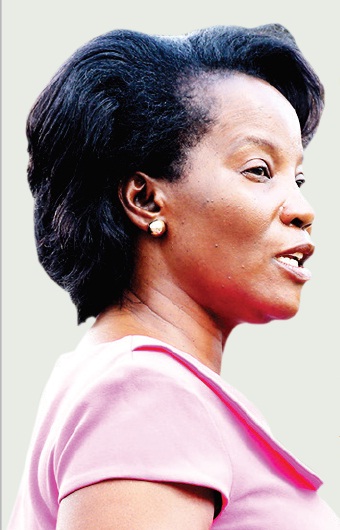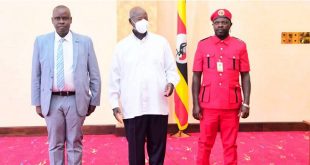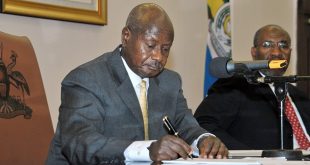Museveni meeting
There is also a lot of talk about mounting political pressure Musisi is facing, allegedly without as much automatic presidential backing as she had in the past.
This is mainly because of how details of a March meeting between President Yoweri Museveni and a cross-section of representatives of Kampala interest groups at the Rwakitura country home are being interpreted. The fact that Kampala residents voted resoundingly for the opposition was high on the agenda of the March meeting at the president’s home in Rwakitura.
Apart from Musisi, Prime Minister Ruhakana Rugunda and Finance Minister Matia Kasaija were in attendance. President Museveni had invited members of a group of Kampala city traders and the leaders were those of different associations of traders, vendors, taxi drivers, truck owners and other service providers.
While details of the meeting remain scanty and it is not clear for what reasons, but it appears Musisi was the centre of all criticism from several service providers and even government officials. Such a reaction would be expected, given that it was hardly a month after the Feb.18 elections in which the ruling party posted poor results in, especially, Kampala and Wakiso.
One by one, the service providers claimed Museveni had lost Kampala with that margin because of the decisions by KCCA. When their volleys against KCCA became too much that President Museveni was forced to first meet them separately and then meet the other leaders later.

A source noted that after that meeting, President Museveni then met the KCCA and other government officials separately. In this meeting, Kasaija, the Finance Minister sought to clear himself and blame Jennifer.
He told the meeting that he had warned Musisi against, for example, levying fresh fees on commercial vehicles but instead of getting in touch Musisi had gone ahead to levy the fees.
Kasaija’s comments came after one of the leaders of the commercial vehicles association complained that they were being charged too much money while in transit.
Under the arrangement, commercial vehicles like Trucks, buses, taxi, among others, have to pay a certain amount payable either on a monthly or annual basis.
The levy, which is computed according to the tonnage or sitting capacity of the vehicle, comes into force after Parliament in July assented to the Kampala Capital City Commercial Road Users’ Regulations, 2015. The law notes that any commercial vehicle in Kampala must have paid for a sticker for operating within or transiting through the city.
The Kampala traders had also kicked off a storm that KCCA had allowed vendors to return to the streets. Vendors returned at the height of campaign time and were threatening to stay. Their threats seemed to gain currency when president Museveni said they had been evicted the wrong way.
That meeting could not have come at a worse time for Musisi. President Museveni had just told journalists that the ruling party National Resistance Movement (NRM) performed poorly in Kampala because Musisi had gone about a good thing—transforming Kampala—but using a wrong approach.
Museveni’s statement surprised many and appeared to demoralise some at City Hall, who throughout Musisi’s term have been assured of the president’s support.
Indeed, in a March 01 statement, Tumwebaze sought to give reassurances.
The minister blamed the President’s criticism against KCCA on certain sections of people with vested interests who, he said, are giving the President wrong information on KCCA’s role in the elections to try and cover up for their own inabilities or create room for their ill-motives to thrive.
“A lot of this opposition was based on selfish commercial interests,” he said, “It is now visible that these forces are hoping to use these election results as an excuse to push through their agenda. Am happy and proud of the KCCA team led by Madam Musisi for all we achieved and still achieving.”
As Minister for Kampala, he said, he chose to firmly support KCCA so as protect them from the unending political altercations and enable them to concentrate on their technical work.
“Therefore, those rushing to give the President biased information against KCCA are only trying to use the challenge of the party’s poor performance in Kampala as a blessing in disguise, to further their earlier on anti- KCCA Agendas,” Tumwebaze added.
Musisi resigns?
Since the meeting, reports have been swirling around that Musisi handed Museveni a letter offering to resign if she was perceived to be a problem. At one point, The Independent learnt that what remained was whether or not Museveni would accept Musisi’s resignation. Looks can be misleading, but it appears Musisi is firmly in her job – implying that crisis could be behind her.
When asked about it, Tumwebaze denied knowledge of Musisi’s offer to resign.
“I have not seen her resignation letter,” Tumwebaze said. However, he also said he was not in the meeting which caused trouble for Musisi.
Efforts to reach Musisi failed as her known numbers could not go through and several calls to KCCA spokesperson Peter Kauju went unanswered.
Whatever the case, Musisi seems to be the target of numerous interests—a situation that is likely to get worse given that the opposition leadership at KCCA is keen to appear to be fighting for the ordinary person.
While some of them said they understand that for Kampala to be transformed there will be sacrifices, they are likely to resist and play the political card.
For instance, immediately after he was elected, Lukwago took to one of the popular Luganda radio stations in the city to criticise the authority for lacking a programme for the urban poor. He said it was a mistake for the authority to reject his proposal to subsidise market dues for low income earners to enable vendors acquire stalls in the new modern markets built by KCCA in several parts of the city. He also insisted that the “there should be parts where street vending is accepted”.
It was a direct rejection of the Kampala Capital City Authority’s position that the city laws outlaw any selling of merchandise on the pavement. Lukwago’s pitch also failed to recognise that the city authorities have attempted to accommodate the low income vendors; by building the new Usafi Market and allowing them to do business on one of the city streets on Sunday. Usafi market authorities charge only Shs. 6000 per month and 50 % of the stalls there remain unoccupied.
And that was just the beginning. Lukwago has already lined up a ‘what to do’ list which he refers to as a “six point programme”. It is anchored on restructuring the rule of law and reconstituting the governance of Kampala, equitable development, social justice, accountability, land and heritage.
Lukwago says he is determined to ensure that there’s value for money. This means the KCCA Council, under him, has to sit and deliberate on policies right from the authority to the five divisions in Kampala. According to him, there’s currently no functional policy making system at KCCA and policies are just imposed on the people by the authority. This time he says, KCCA needs to come up with clear deliverables.
“I want a system that resonates with the will of the people not this master- slave relationship,” he told The Independent in an interview.
He says this is necessary because each year, the KCCA budget is increased but the increased resources have not been reflected in increased services.
He told The Independent: “There’s no way the city can develop into a modern metropolis when there are no simple things like a well-defined structural plan. A gazetted plan that can be used by the authorities to approve the kind of structures acceptable in a particular part of the city.”
But Tumwebaze told The Independent that for them to work together, “Lukwago needs to first tame his ego and focus on serving the people and not mere cheap politicking”.
“Whatever we do as government and what we shall be doing even in the new term in Kampala will always be guided by the law,” Tumwebaze said, “We shall continue to serve the people of Kampala with or without Lukwago’s efforts.
“If he comes now ready to serve people, we shall work with him, just the same way NRM works with other rational opposition leaders”.
For now, it is not clear what Musisi’s plans are. But she must be ready to take most of the heat – if she stays on the job.
 The Independent Uganda: You get the Truth we Pay the Price
The Independent Uganda: You get the Truth we Pay the Price


